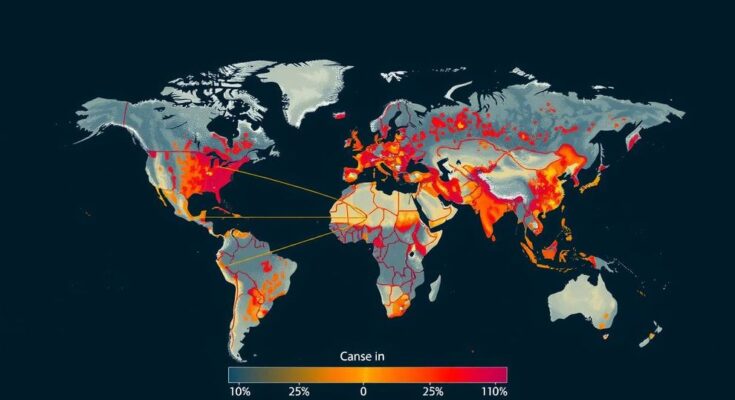Researchers link nearly a fifth of the global dengue cases this year to climate change, revealing that rising temperatures facilitate the spread of the disease by expanding mosquito habitats. The study projects significant increases in dengue incidence in susceptible regions, emphasizing the public health implications of climate change.
A significant proportion of the unprecedented dengue cases reported globally this year—approximately one-fifth—can be attributed to climate change, according to researchers from the United States. This connection underscores how rising temperatures facilitate the spread of diseases. Climate change has prompted scientific efforts to establish links between extreme weather phenomena and health impacts, particularly infectious diseases. The study suggests that dengue, which is influenced by climate conditions, serves as an ideal model for understanding the broader implications of global warming on health. The study, headed by Erin Mordecai, an infectious disease ecologist from Stanford University, found that mosquito populations, which transmit dengue, are expanding into new regions due to rising temperatures. Specifically, climates between 20-29 degrees Celsius are optimal for dengue virus transmission. It was observed that elevated regions of South America, including countries like Peru and Brazil, are projected to see a rise in dengue cases by up to 200% in the next 25 years. The research indicates that approximately 257 million individuals currently reside in areas where global warming could amplify dengue rates significantly. This alarming trend reinforces the imperative to address climate change, as the link between it and increasing dengue cases may present substantial public health risks. The World Health Organization reported that over 12.7 million confirmed dengue cases have surfaced this year, with actual figures estimated to be much higher due to substantial underreporting.
Climate change is increasingly recognized as a key driver of health issues worldwide. Specifically, it has been linked to the proliferation of vector-borne diseases such as dengue fever, primarily transmitted by mosquitoes. The interaction between rising global temperatures and the epidemiology of infectious diseases is an emerging area of research. Researchers aim to elucidate how climatic factors influence the distribution and incidence of diseases, thereby highlighting the significance of climate change in public health contexts.
In summary, a major segment of current global dengue cases—nearly 20%—is linked to climate change, indicating a concerning trend in public health threats exacerbated by rising temperatures. The study emphasizes that climate conditions significantly influence the rates of diseases like dengue, particularly in vulnerable regions. With ongoing efforts to combat this issue through innovative methods such as the release of Wolbachia-infected mosquitoes, it is critical to address the broader concerns surrounding climate change and its implications for global health.
Original Source: www.barrons.com




